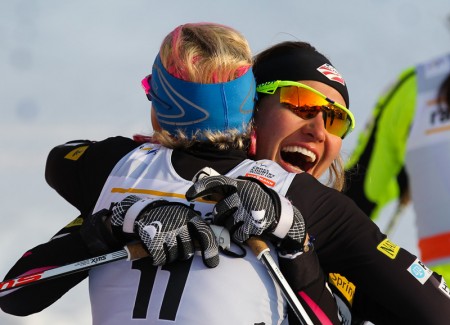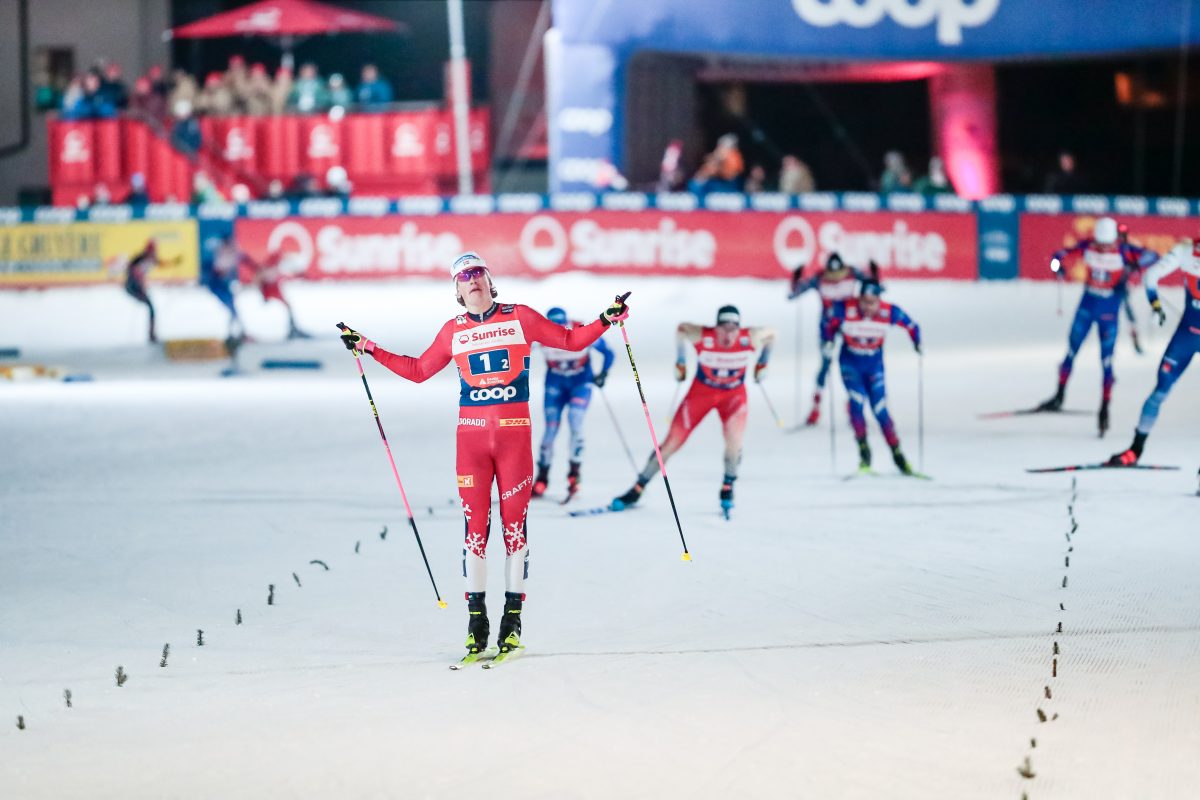
It could have been a disappointing day for American Kikkan Randall.
She was in the semi-finals of the World Cup Drammen City Sprints in Norway. Her skis were lightning quick – her best high-pocket klister skis were giving her perfect kick on the uphills, but she was still able to “glide through the pack on the downhills.”
And move through the pack she did. She started conservatively, fifth out of six in her heat. Then on the main downhill of the 1.3-kilometer course she reached speeds of nearly 50 k/hour, advancing through the pack. The enormous power which has made her a feared competitor in international skiing moved her into second-place on the uphill that followed.
The all-out striding sprint up to the finish looked like it was being played in fast-forward as skis clattered across the snow. Norway’s Ingvlid Flugstad Østberg was in front. Randall in second. But Sweden’s Stina Nilsson was moving, unbelievably, faster than Randall. There is a final, short, steep uphill to the finish. Ostberg crossed first. Randall lunged, but Nilsson lunged more, crossing the line a heart-breaking two-hundredths of a second ahead of Randall, eliminating her from the finals.
“Less than a toenail in front,” as the Eurosport announcer put it.
“Definitely frustrating!” Randall said.
But that was the last of the bad news for Randall.
“Within a couple of minutes I had walked inside to change into a dry shirt, and someone came running in and said ‘you won the Sprint Globe!’ I just said ‘What? What are you talking about?'”
No mistake. The points had been calculated. Since the World Cup final sprint in Falun, Sweden are part of a mini-tour, they only award half points. This meant that no matter how the final sprint turns out, her closest competitor, Germany’s Denise Herrmann, could not make up the difference. Randall’s lead was unimpeachable. She would take her third-straight Sprint Cup Championship home with her to Anchorage.
“but… that’s sprinting, man”
“Racing in Drammen is always really exciting because you’re in the middle of a city, you’ve got tons and tons of fans out there and all the fans know who you are, so it’s a great atmosphere,” Randall said. “Today I knew it was important to fight for the Sprint Overall so I was definitely anxious coming into the race, but I felt really strong and my skis were good so it was a great day to get in there and mix it up.”
Randall definitely looked like a contender throughout the race. Her powerful double-poling made passing some of the fastest women in the world look easy.
“I definitely knew that it was close [at the finish]. I could feel that we were all kind of neck-and-neck. Ingveld [Østberg] was just a half a stride ahead of us and then I could tell someone was coming. So I was just trying to give everything I could to the line, and just that last little pitch before the finish is always kind of funky, so I tried to lunge the best I could, but… that’s sprinting, man – it’s always really exciting all the way to the line, you just gotta keep giving it all the way.”
Randall and Nilsson had to wait on the outcome of the photo finish to learn who would advance to the next round. It wasn’t until after the end of the next heat that Randall found out that she would not advance to the finals, and would end up in seventh place, the top spot for a non-finalist.
“I knew it was close,” she said. “Too close to call.”
“I had a great quarter-final and actually a great semi-final too, just unfortunately was 0.02 seconds too short to make the final. That was kind of a bummer because I felt like I was getting stronger every round,” she continued. “I was feeling really good and I wanted the chance to go one more time around. And then watching how the final played out… I mean, the girls that I was right there with were on the podium so it would have been great to try to go for another classic podium. I think I definitely had that within my reach today so it was a bummer to miss out by such a close margin.”
“you’re grumpy and a little bit frustrated but that good news makes it a little bit better.”
Missing the sprint final in Drammen by such a tiny margin was a bitter pill to swallow. Such tiny discrepancies in sprint racing are psychologically difficult for the athletes.
“You know, a margin like that is the difference between a slightly better foot lunge – small things, like that,” said U.S. Ski Team Coach Matt Whitcomb. “So it’s really easy to think back as an athlete on what could have been a little bit different. But clinching the third-straight globe certainly swallowed-up that distraction.”
How did the Sprint Globe factor into Randall’s own goals for the season?
“This year was really focused around the Olympics, so the Sprint Cup was kind of a secondary goal, but it was something that I still very much wanted to fight for,” she said.
Randall is fresh off of a disappointing Sochi Olympics, where she was widely-seen as a favorite for a sprint medal, but was eliminated in a quarterfinal stacked with tough competitors. But last weekend in Lahti, Finland, she proved that she was still a force to be reckoned with, taking the top spot in the skate sprint, her forte.
Randall has proven that she’s the toughest sprinter in the world three years in a row. So what happened at the Olympics?
“I think certainly my form was not where I wanted at the Olympics,” she said. “I already have a different feeling [in my body]. I think coming back down from altitude certainly helped. You know, we spent a lot of time at altitude getting ready for Sochi and I think that maybe we didn’t get the balance quite right, and so I didn’t have quite the right capacity that I wanted up there.”
“But I also know that I’ve done a lot of racing now,” she continued. “I’ve raced four races at the Olympics, two last weekend, and I think that has just kind of sharpened me again. It’s always a bummer when the Olympics has already come and gone but it’s great to feel like I’m ending the season on a high note, and I’m looking forward to fighting it out in a few more races.”
How does Randall’s third-straight Globe resonate for U.S. skiing in general?
“It’s really, really big,” Whitcomb said. “The first one was record setting and proclaimed that we’d arrive at least with one great athlete. Now it’s saying ‘we’ve arrived, and we’re here to stay.’”
–Pasha Kahn contributed reporting.



